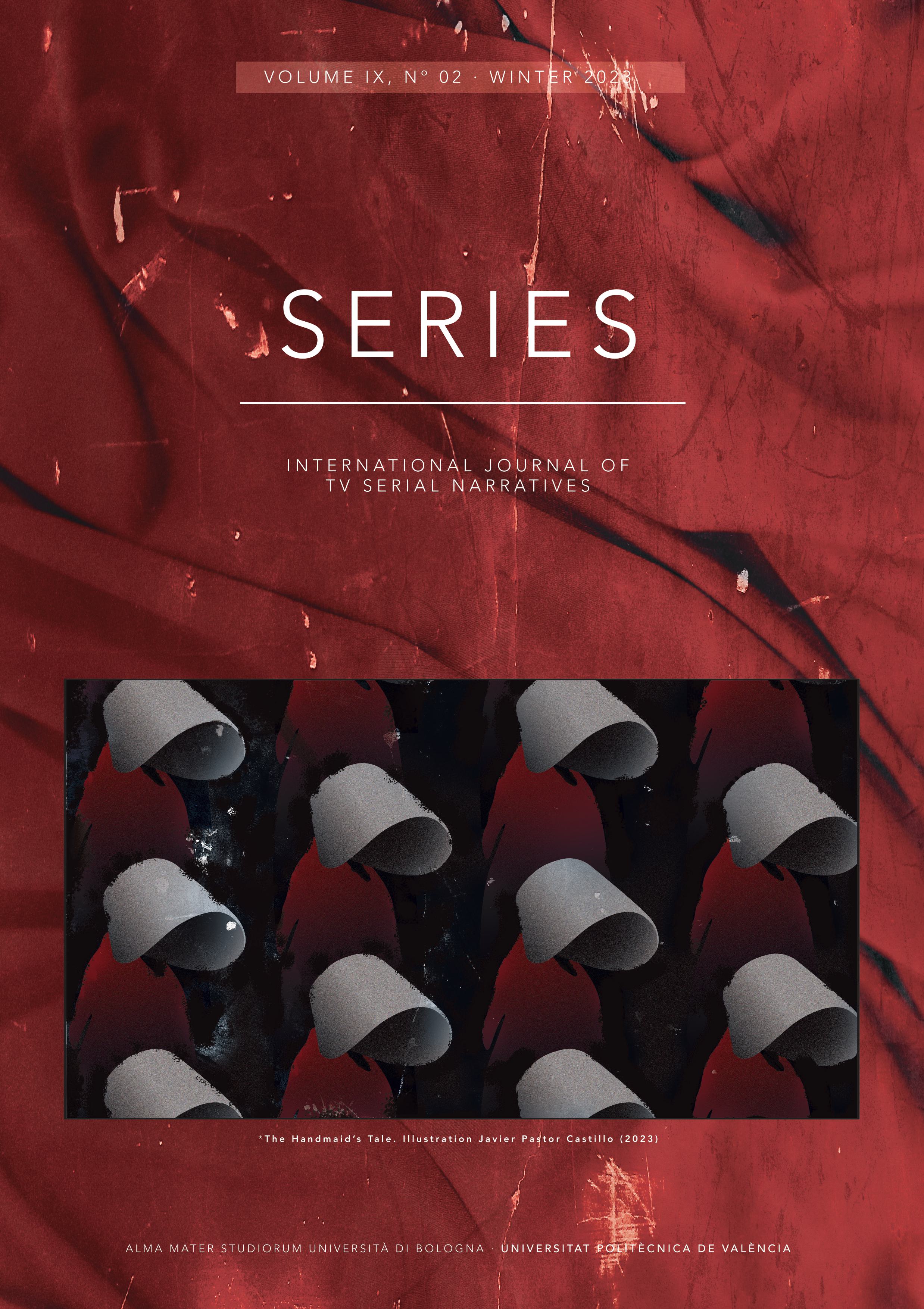National Team of Greece: Gender, Sports, and the Recession
DOI:
https://doi.org/10.6092/issn.2421-454X/19233Keywords:
television fiction, MEGA Channel, Giorgos Kapoutzidis, recession, crisis, GreeceAbstract
National Team of Greece (2015) was a dramedy broadcast on Greek television revolving around a group of women’s efforts to establish the first Greek women’s curling team, amidst a number of personal challenges and societal obstacles, as much as against the backdrop of a country in deep political and economic crisis. Building on scholarly approaches to the ideological role of popular culture in turbulent times, this article examines the infiltration of recession themes in the content of television fiction, while centralizing a gendered reading of the narrative of the case at hand. Specifically, it provides a critical reading of the main narrative strategies of the programme – the female narrator, the female ensemble, and the metaphor of sports – in order to register the ways that the series enters into a dialogue with familiar gender tropes, such as questions of female agency, coping, and empowerment. Finally, it discusses the concept of empowerment and the ways it is accomplished or impeded within television in the (post)recessionary cultural moment, by focusing on aspects of the series’ production and reception.
References
Alexandris, Aris (2015). “H ‘Εθνική Ελλάδος’ του Καπουτζίδη είναι στρατευμένη τέχνη.” To Kouti tis Pandoras, 21 March 2015. https://www.koutipandoras.gr/article/h-ethniki-ellados-toy-kapoytzidi-einai-strateymeni-tehni/ (last accessed 15 March 2024).
Allrath, Gaby, Gymnich, Marion & Surkamp, Carola (2005). “Introduction: Towards a Narratology of TV Series.” In Narrative Strategies in Television Series, edited by Gaby Allrath and Marion Gymnich, 1-43. Houndmills/Basingstoke: Palgrave Macmillan.
Ball, Vicky (2012). “Forgotten Sisters: The British Female Ensemble Drama.” Screen 54(2): 244-248. https://doi.org/10.1093/screen/hjt014.
Bonzel, Katharina (2013). “A League of their Own: The Impossibility of the Female Sports Hero.” Screening the Past, 37.
Boyle, Kirk & Mrozowski, Daniel (2013). “Introduction: Creative Documentation of Creative Destruction.” In The Great Recession in Fiction, Film, and Television: Twenty-First-Century Bust Culture, edited by Kirk Boyle & Daniel Mrozowski, ix-xxvi. Lanham, MD: Lexington Books.
Brunsdon, Charlotte (1997). “The Role of Soap Opera in the Development of Feminist Television Criticism. In Screen Tastes: Soap Opera to Satellite Dishes, edited by Charlotte Brunsdon, 29-44. London & New York: Routledge.
Buonanno, Milly (2008). The Age of Television: Experiences and Theories. Bristol: Intellect Books.
Crosson, Seán (2013). Sport and Film. London & New York: Routledge.
Davies, Helen and O’Callaghan, Claire (eds.) (2017). Gender and Austerity in Popular Culture. Femininity, Masculinity & Recession in Film & Television. London & New York: I.B. Tauris.
Dittmer, Jason (2005). “Captain America’s Empire: Reflections on Identity, Popular Culture, and Post-9/11 Geopolitics.” Annals of the Association of American Geographers 95(3): 626-643. https://doi.org/10.1111/j.1467-8306.2005.00478.x.
Eder, Jens, Jannidis, Fotis & Schneider, Ralf (2010). “Characters in Fictional Worlds: An Introduction.” In Characters in Fictional Worlds: Understanding Imaginary Beings in Literature, Film, and Other Media, edited by Jens Eder, Fotis Jannidis, and Ralf Schneider, 3-64. Berlin & New York: De Gruyter.
Hills, Laura & Kennedy, Eileen (2013). “Ready, Set, Action: Representations of Coaching through Film.” In Routledge Handbook of Sports Coaching, edited by Paul Potrac, Wade Gilbert, and Jim Denison, 40-51. New York: Routledge.
Hoth, Stephanie (2010). “The Female Voice in Sex and the City and Desperate Housewives: Voice-Over Narration in Contemporary American Television Series.” In Gendered (Re)Visions: Constructions of Gender in Audiovisual Media, edited by Uwe Baumann, Marion Gymnich, and Barbara Schmidt-Haberkamp, 79-102. Goettingen: V&R Unipress.
Ioannou, Stathis (2017). “‘Εθνική Ελλάδος’: Υπήρχε κι αυτή η ελληνική τηλεόραση…” Maxmag, 21 November 2017. https://www.maxmag.gr/thematikes/exalipsi-tis-vias/ethniki-ellados-ypirche-ki-afti-elliniki-tileorasi/ (last accessed 15 March 2024).
Jones, Amanda & Aitchison, Cara Carmichael (2007). “Triathlon as a Space for Women’s Technologies of the Self.” In Sport and Gender Identities: Masculinities, Femininities and Sexualities, edited by Cara Carmichael Aitchison, 63-83. London & New York: Routledge.
Kapoutzidis, Giorgos (2016). Personal communication (7 September 2016).
Kozloff, Sarah (1988). Invisible Storytellers: Voice-Over Narration in American Fiction Film. Berkeley: University of California Press.
Lanser, Susan S. (2004). “Sexing Narratology: Toward a Gendered Poetics of Narrative Voice.” In Narrative Theory: Critical Concepts in Literary and Cultural Studies, edited by Mieke Bal, 123-139. London & New York: Routledge.
Leonard, Suzanne (2014). “Escaping the Recession? The New Vitality of the Woman Worker.” In Gendering the Recession: Media and Culture in an Age of Austerity, edited by Diane Negra and Yvonne Tasker, 31-58. Durham & London: Duke University Press.
Mylonas, Yiannis (2012). “Media and the Economic Crisis of the EU: The ‘Culturalization’of a Systemic Crisis and Bild-Zeitung’s Framing of Greece.” tripleC: Communication, Capitalism & Critique 10(2): 646-671. https://doi.org/10.31269/triplec.v10i2.380.
Mylonas, Yiannis (2014). “Crisis, Austerity and Opposition in Mainstream Media Discourses of Greece.” Critical Discourse Studies 11(3): 305-321. https://doi.org/10.1080/17405904.2014.915862.
Negra, Diane & Tasker, Yvonne (2014). “Introduction: Gender and Recessionary Culture.” In Gendering the Recession: Media and Culture in an Age of Austerity, edited by Diane Negra and Yvonne Tasker, 1-30. Durham & London: Duke University Press.
O’Connor, Pat (1992). Friendships between Women. New York: Guilford.
Porto, Mauro P. (2005). “Political Controversies in Brazilian TV Fiction: Viewers’ Interpretations of the Telenovela Terra Nostra.” Television & New Media 6(4): 342-359. https://doi.org/10.1177/1527476405279862.
Poulton, Emma & Roderick, Martin (2008). “Introducing Sport in Films.” Sport in Society 11(2-3): 107-116. https://doi.org/10.1080/17430430701823349.
Rowe, David (2004). Sport, Culture and the Media. Buckingham: Open University Press.
Schuyler, Susan (2015). “Reality Television, Melodrama, and the Great Recession.” Studies in Popular Culture 37(2): 43-65.
Whannel, Garry (2008). “Winning and Losing Respect: Narratives of Identity in Sport Films.” Sport in Society 11: 195-208. https://doi.org/10.1080/17430430701823422.
Wodak, Ruth (2010). “The Glocalization of Politics in Television: Fiction or Reality?” European Journal of Cultural Studies 13(1): 43-62. https://doi.org/10.1177/136754940935255.
Downloads
Published
How to Cite
Issue
Section
License
Copyright (c) 2023 Georgia Aitaki

This work is licensed under a Creative Commons Attribution 4.0 International License.




